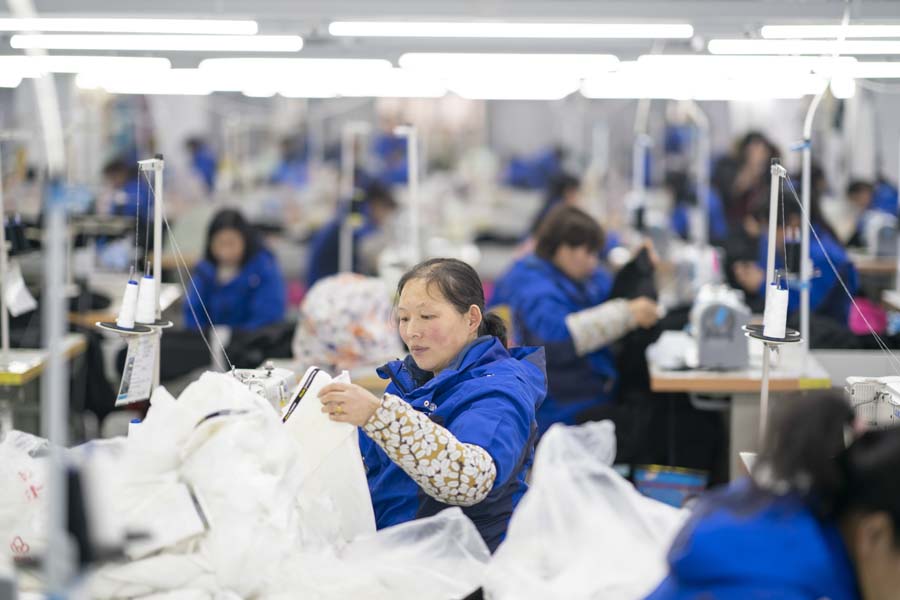Poverty Alleviation in Lushi County

Lushi County in Sanmenxia City was one of the four poorest counties in central China’s Henan Province. The county is located in a mountainous area with over 4,000 hills and 2,400 rivers and streams. In the past, many poverty-stricken households were scattered across this area.
In early 2016, the poor population in Lushi County was 63,134 in 19,645 households, and the poverty rate was as high as 18.9 percent. The harsh natural environment and poor living conditions, as well as difficulty in accessing clean water, convenient transport, decent schooling, medical treatment and employment, have been the root causes of poverty for many households in the mountainous county. To eliminate the causes of poverty, they must move out of the mountains.
Rows of six-story buildings are distributed neatly in Xingxianli Community, a resettlement site for poverty alleviation in Hengjing area of Lushi County. They are the new homes for 11,212 people from 2,749 poor families who had lived in deep mountains for generations. They moved into the community for a new life that has helped them get rid of poverty.
Xingxianli Community, located in Yingzi Village, Hengjing Town, is the main resettlement area of Lushi County. As the largest resettlement community in Henan Province, it covers an area of more than 30 hectares, and consists of a total of 83 six-story buildings.

In the morning, Liu Juan, a resident of Xingxianli Community, puts vegetables onto the shelves in the supermarket she works for. In order to take care of her parents with health problems, she cannot work far from home. With the help of the community, she received training in basic computer skills and now works as a cashier in the supermarket near her home.

Farmers of an agricultural cooperative in Guzhai Village, Lushi County, are raising orchids. Founded in 2018, the cooperative has helped 10 households in the village rise from poverty.
Without arrangements for employment, it would be difficult for the relocated poor people to subsist. In order to prevent the relocated households from “dwelling in new houses while living a hard life,” Lushi County combines resettlement with arrangements for employment by taking advantage of various resources from both the resettlement area and the area where the relocated residents used to live.

Wang Junwei (left), first Party secretary in charge of poverty alleviation in Miaoshang Village, part of Guzhai Village in Lushi County, visits a local villager who grows shiitake mushrooms. Currently, 210 of the 270 households in Guzhai Village are engaged in shiitake mushroom cultivation.

Huang Huaimin, a resident of Guzhai Village, trims the branches of a kiwi fruit tree. In 2016, Huang got a loan of 50,000 yuan (around US$7,000) for planting kiwi fruit trees.
More than 70 industrial bases have been built at 55 resettlement sites in Lushi County, which benefited more than 10,000 people. In addition, more than 20 poverty alleviation workshops were built, providing more than 6,000 jobs, and eight photovoltaic power stations were constructed to ensure 502 relocated households have stable incomes. All of those measures have helped achieve full employment of laborers from relocated households.

Tian Xihui (left) and his fiancée Guo Liuwen, who now live in Xingxianli Community, are checking the celebration materials to be used for their wedding.

Tian Xihui (middle) is decorating his new house with his relatives.
At the same time, Lushi County integrated the resettlement of poverty-stricken households with the development of such special industries as fungi, medicinal herb and fruit cultivation. Some leading enterprises have taken the initiative to offer the locals shares, dividends, jobs and business opportunities, which are strong and continuous support for resettlement. Through effective policy arrangements in industrial development, employment and entrepreneurship, the poor have not only moved into new houses, but also led a better life. Poverty alleviation and future development after resettlement have become a reality, and the “Lushi mode” of deep integration of resettlement and industrial arrangement was established.

Haoyang Garment Factory is less than 10 kilometers away from Xingxianli Community, Lushi County. Among around 300 workers in the factory, 86 are from poor families, including nine from Xingxianli Community.

Sun Yuanyuan (left) helps customers outside a local bank near Xingxianli Community, Lushi County. She got a job as a lobby manager at the bank after finishing computer skills training courses at the community center.
Around China, there are numerous outstanding examples of poverty alleviation like Lushi County. It is estimated that China reduced the number of poor people by more than 10 million and lifted about 340 counties out of poverty in 2019. The task of poverty alleviation through resettlement is basically complete. President Xi Jinping pointed out that without a moderately prosperous life for poor people, a moderately prosperous society in all respects cannot be built. China is expected to completely eliminate poverty this year, and a moderately prosperous society in all respects is within reach.

Volunteers make dumplings for an elderly couple in Xingxianli Community.
